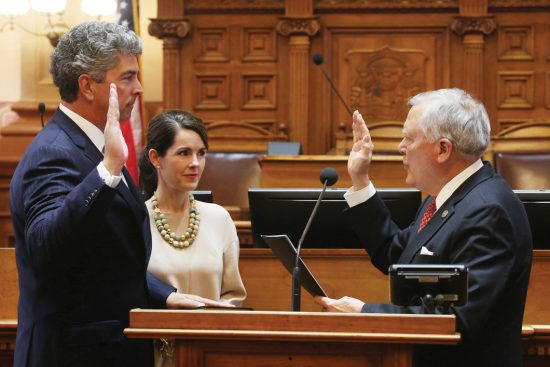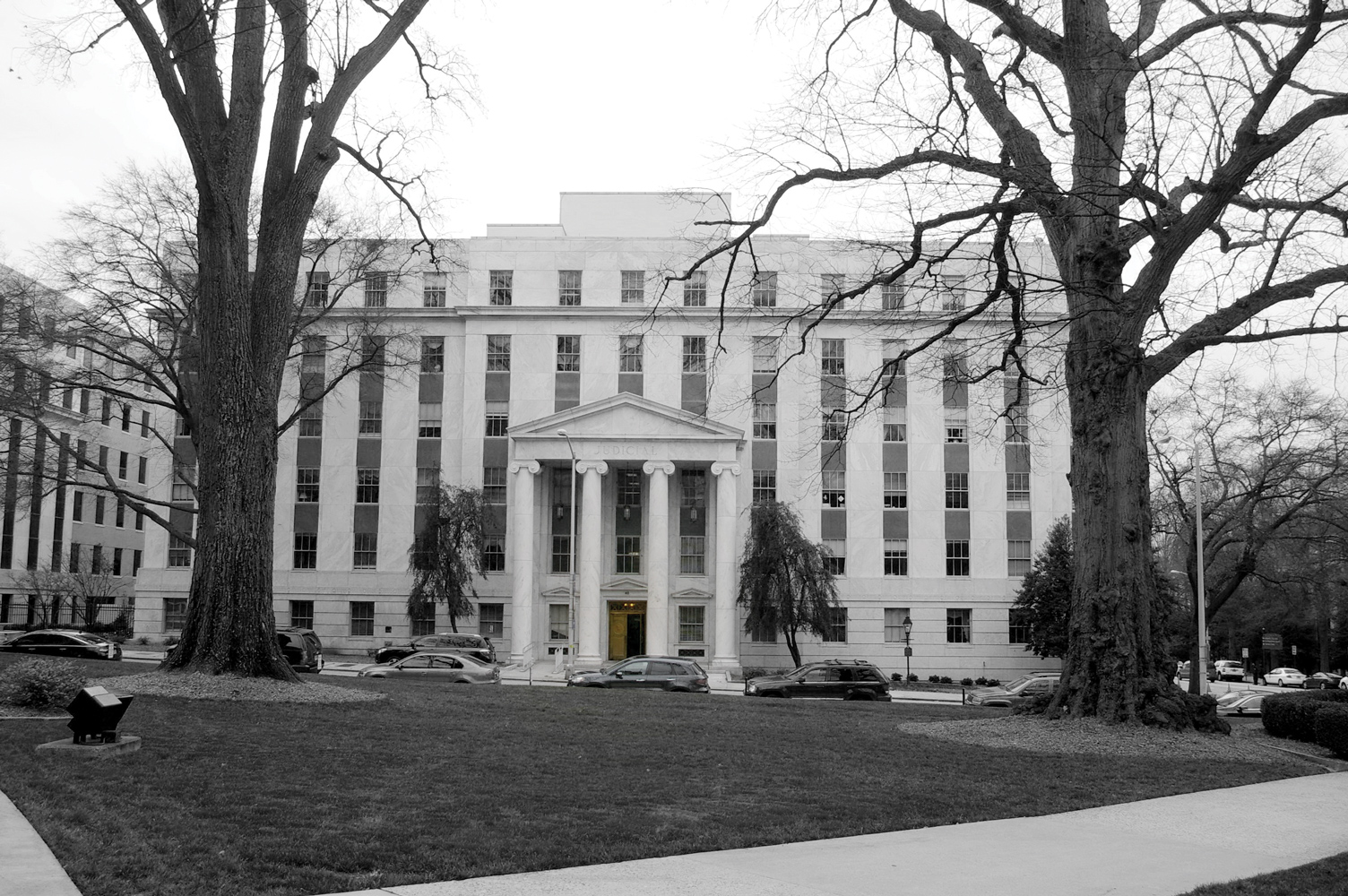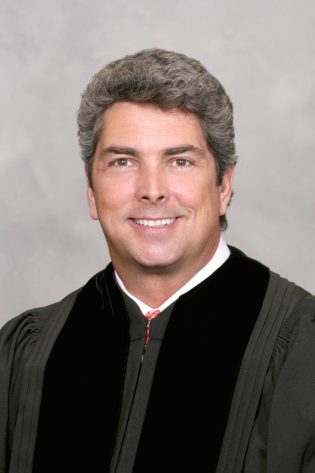A Seat on The Bench
Alumnus ascends to Georgia’s highest court
In 2004, an up-and-coming member of the Georgia House won the nonpartisan race for a superior court judgeship in Waycross, Georgia. A dozen years later, the Honorable Michael Boggs (’85) is one of the newest justices on the Georgia Supreme Court. Sworn into office just months ago, he says his seat on the state’s highest court is another opportunity for him to “continue my commitment to public service to the citizens of Georgia.”
At his core, the Waycross, Georgia, native is a dedicated public servant in the real sense of the word. “Growing up,” he says, “the lawyers in my community were public servants. Many of them held elected office or were otherwise active in helping others in the community. This type of public service appealed to me.”

SERVING GEORGIA Justice Boggs was sworn into office on the Georgia Supreme Court on Dec. 7, 2016.
The Early Years
The justice’s interest in the law began at an early age. The son of a federal law enforcement agent, he reasoned an education in law would provide a gateway into a career in public service. Boggs arrived in Statesboro during a critical period in his life. An injury had ended his football career during his first year at Georgia Tech. He transferred to Georgia Southern to be closer to family and friends and because the political science program “would provide a great foundation for law school.” It also didn’t hurt that his older brother, Gary Boggs (’77) was an alumnus.
One of the toughest experiences in his life occurred the summer before his senior year. His father, the man he admired and sought to emulate, died of cancer at age 47. “Watching him taught me a lot about life,” Boggs says. “He taught me to have respect and compassion for others, particularly those less fortunate, the importance of helping others through public service, and he taught me the value of hard work and sacrifice. Above all, he instilled in me the importance of faith. In spite of his untimely passing, those lessons helped shape the person I am today.”
Justice Boggs initially planned to get his law degree and join the FBI. But after graduating, he accepted the opportunity to work as a legislative aide for a Georgia congressman in Washington. “This changed everything,” he explains. “I enjoyed Washington, and this opportunity more than anything else in my life, stimulated my interest in politics and public service and shaped my professional career. After two years in D.C., I returned to Georgia to attend law school at Mercer University.”
His years in Statesboro shaped him personally as well as academically. “Georgia Southern graduates are everywhere and are always willing to help one another,” he says. He remembers it was an exciting time to be a student at Georgia Southern. “The energy surrounding Erk Russell, football and a new stadium was palpable,” he notes. “It was clear that the college was on the cusp of enormous growth.”
From Politics to the Bench
Boggs spent 14 successful years maintaining a general trial practice, specializing in personal injury matters and family law. But politics beckoned. In 2000, he ran for a Ware County seat in the Georgia Legislature and won. During a successful four-year stint, he was named by Georgia Trend Magazine as one of 40-under-40 rising stars in Georgia, and named the most outstanding freshman legislator. “I enjoyed the Legislature, despite the fact that it was challenging to serve with my home and a solo law practice 240 miles away,” he says.
Among many legislative accomplishments, Boggs authored the Child Protection Act, a bill aimed at protecting children from sexual predators, and was successful in persuading the legislature to build a public health laboratory in Waycross. “I made some incredible friendships through my Legislative service and enjoyed the public policy process,” he says. “Nonetheless, I couldn’t pass on the chance to run for a seat on the Superior Court bench and the opportunity to turn to nonpartisan public service in the judicial branch.”
In 2004, Boggs was elected Superior Court Judge in the Waycross Judicial Circuit where he served for seven years. Many of the felony criminal cases in his court involved non-violent property and drug offenses driven by the offenders’ substance abuse issues. “I was tough on crime, but was frustrated with the cyclical pattern of sending these low-risk drug offenders to jail or putting them on probation, only to see them repeat the same behavior almost immediately. Despite its high cost, our corrections system was doing little to ‘correct’ offender behavior and improve public safety with these offenders,” says Boggs.
To combat this dilemma, he established the circuit’s first drug court. Less expensive than incarceration, these programs help people get beyond their addictions and become productive citizens. Strenuous and significantly more onerous than regular probation, the programs include addiction counseling, curfews and weekly drug screenings for offenders. Participants are also required to obtain employment and get their GED. Boggs says the program costs about $4,300 a year per participant, considerably less than the $18,000 a year for a bed in Georgia’s prison system. “Thirty percent of all inmates released from prison in Georgia will reoffend within three years compared to between seven and ten percent of drug court graduates. The program produces a better public safety result for less taxpayer money and morally, it’s the right thing to do,” he adds.
Tapped for State Court of Appeals
The alumnus enjoyed the challenges of being a superior court judge. But in 2012, Georgia Gov. Nathan Deal appointed him to a vacancy on the Court of Appeals of Georgia. “I’ve found that the best way to describe the role of an appellate judge is to emphasize that appellate courts do not provide a ‘do-over’ for the losing side,” he explains. “Appellate judges do not ‘re-hear’ the evidence or allow for the introduction of new evidence to give the losing side a chance with a new set of judges. Instead, the court essentially focuses on whether the trial court committed an error of law that affected the outcome of the case.”
As one of the busiest intermediate appellate courts in the country, Boggs says his most pressing challenge on the court involved an ever-increasing caseload. Each year, Court of Appeals judges are assigned approximately 120 cases for disposition and must also review, and vote on roughly 240 cases from the other judges on their three-court panel. “Knowing every case in important to someone, it is imperative that our appellate courts take a very serious and thoughtful approach to each case and remain mindful of the impact of our decisions.”
Then a new opportunity was presented to Justice Boggs. Six years ago, Georgia had one of the highest incarceration rates in the country. Spending on corrections cost the state more than a billion dollars a year, and the inmate population was projected to increase by eight percent over five years at a cost of $264 million. To tackle the growing issue, Gov. Deal and the Georgia General Assembly created the Georgia Council on Criminal Justice Reform. By appointment of the governor, Boggs has co-chaired the council since 2012. The goal was for the state to devise a smarter and more fiscally responsible way to deal with low-risk/non-violent people who break the law, while ensuring that the state kept its most serious violent offenders in prison.
“Georgia has become a national leader in enacting thoughtful and responsible criminal justice reform policies that hold offenders accountable, improve public safety and save taxpayer dollars,” the justice says. The state earned its new reputation by rewriting the juvenile code, carefully drafting changes to adult criminal statutes, and by expanding and creating new accountability court programs (DUI, mental health, veterans, domestic violence, etc.) to divert nonviolent offenders from prison. “As a judge who regularly witnessed the impact substance abuse issues have in our state’s judicial system, this criminal justice policy work has been extremely rewarding,” Boggs says.
Boggs maintains chambers in the State Judicial Building in Atlanta while maintaining his permanent residence in Blackshear, Georgia, where he and his wife, Heather, an elementary school teacher and fellow Georgia Southern graduate (‘91), reside. In his chambers at the state Supreme Court, he keeps the badge his father wore as an agent for the Bureau of Alcohol, Tobacco and Firearms and a John MacArthur Daily Devotional. “These items are simple reminders of lessons learned and the importance of faith,” Boggs says. “I’m grateful for the opportunities God has provided for me, and I am amazed at the journey I’ve taken since leaving Georgia Southern. I have been truly blessed.” — Sandra Bennett
GETTING A JUMP ON LAW SCHOOL: Pre-law at Georgia Southern

The Office of Pre-Law Advising is raising the bar for students planning to enter law school. Georgia Southern does not have a pre-law major; however, the office, created in 2003, helps students get into law school.
The Law School Admission Council (LSAT) Action Report reveals for the 2014-15 academic year, 80 percent of Georgia Southern students who applied for law school were accepted by one or more schools. That’s more than double the 30.9 percent in the year prior to the office’s founding. Eagle graduates are admitted to prestigious law schools across the country. They include the University of Georgia, Harvard, Duke, Emory University and the University of California-Berkeley.
“The law school admissions process is almost as stressful as law school actually is,” said Brian Griffin (’15) (at right), who is now in his first year at the University of Georgia Law School. “The Office of Pre-Law Advising is here to offer its support and answer any questions that an aspiring law student may have. The office does a great job of pulling back the curtain.”
Office of Pre-Law Advising Director Rebecca Davis, J.D., said that the most frequently asked question is “What major should I choose?” She is one of three faculty advisors in the Office of Pre-Law Advising. “A bachelor’s degree without any qualification as to courses or major is all that is required, so students should opt for a major they enjoy and in which they will excel. They also want to be sure to develop their skills in reading, researching, writing, oral communication, and critical analysis.”
Undergraduates with a high GPA and a strong LSAT score also gain a competitive edge for admission and for merit-based scholarships. The pre-law office provides other advantages. “For instance, LSAT prep and writing a personal statement are the two biggest challenges that face our pre-law students,” Davis explained. “The Office of Pre-Law Advising administers two free practice LSATs per semester, and we spend a lot of time providing feedback on students’ personal essays so they can be effective advocates for themselves.”
“The Office of Pre-Law Advising helped me review and revise my personal statement,” said Griffin, a political science major. “Due to her years of experience, Professor Davis knows exactly what to look for in a winning personal statement, which is a vitally important part of the law school admissions process. However, I should note that she is often willing to help students better their own personal statements, but not write it for them.”
Griffin also says he took advantage of one of the free LSAT administrations. “The LSAT is one of the most important parts of the law school admissions process, and the score that one makes is often the greatest determinant of which schools will extend an offer of admission,” he said. “In my opinion, taking real practice exams under timed conditions that mirror those of an actual LSAT administration is one of the smartest things that a student trying to gain admission into a top-tier law school can do. Having been under that level of stress before the actual test really helped me calm my nerves when the actual examination came around.”
The Office of Pre-Law Advising is supported by the endowed Judge Faye Sanders Martin Pre-Law Fund. The two other faculty advisors in the office are Kathleen Comerford, Ph.D., in the history department and Maureen Stobb, Ph.D., in the political science department.


